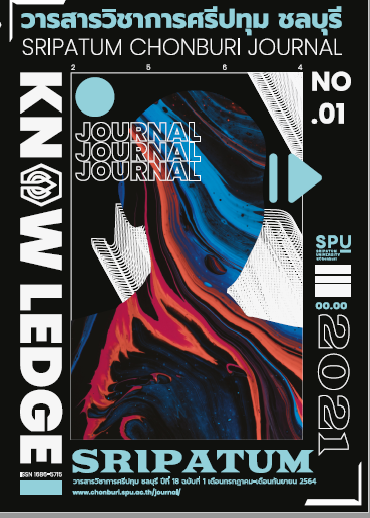GUIDELINES FOR MANAGEMENT OF NON-FORMAL EDUCATION TO ENHANCE LIFE SKILLS LEARNGING FOR STUDENTS WITH HEARING IMPAIRMENTS
Keywords:
life skills, non-formal education management, students with hearing impairmentsAbstract
This research aimed to study the problems and needs for life skills learning of students with hearing impairments, and 2) propose guidelines for the management of non-formal education to enhance life skills learning for students with hearing impairments. The qualitative methods, the study groups were administrators and teachers in school for deaf, specialists in educational management for students with hearing impairments, and specialists in non-formal education. Conducted data analysis of 4 life skills: interpersonal relationship, coping with emotion and coping with stress, self-awareness and self-esteem, and decision making and problem solving. All the data were analyzed by categorizing the data and then performed conclusions. The study of life skills problems of students with hearing impairments found that for decision-making and problem-solving skills, there were no opportunities for them to think and make decisions for themselves. As for self-awareness and self-esteem skills, students had no confidence. For the life skills learning needs for students with hearing impairments, it was found that teachers needed the enhancement of the life skills for their students as soon as possible. The priority should be the life skills of decision making and problem solving through repetitive activities. Regarding the management of non-formal education to enhance life skills learning for students with hearing impairments, it was divided into 2 areas as follows: 1) The factors of management studies were found that teachers should design and integrating life skills learning into regular learning courses or activity hours. It also should apply all of 4 skills in a single activity. Students must be able to use sign language for communication. The duration of the activity should not take too long, and 2) Steps in educational management. At the introduction stage, teachers should study the needs of their students and create a learning atmosphere. As for body stage, teachers should encourage students to involve in designing the learning process. In terms of conclusion and evaluation should be done as soon as the learning was completed.
References
ปริญญา สิริอัตตะกุล. (2555). ความสามารถในการเข้าถึงข้อมูลข่าวสารเพื่อการพึ่งตนเองของผู้พิการทางการได้ยิน กรณีศึกษา จังหวัดชลบุรี. นนทบุรี: สถาบันสร้างเสริมสุขภาพคนพิการ.
ปริญญา สิริอัตตะกุล. (2561). การพัฒนาโมเดลความสัมพันธ์เชิงสาเหตุของทักษะทางสังคมในเด็กหูหนวกโดยมี
ความสามารถในการเข้าใจความคิดของผู้อื่นเป็นตัวแปรส่งผ่าน. วิทยานิพนธ์ศิลปศาสตรดุษฎี
บัณฑิต สาขาวิชาจิตวิทยาพัฒนาการ, คณะจิตวิทยา จุฬาลงกรณ์มหาวิทยาลัย.
ปริญญา สิริอัตตะกุล และคณะ. (2558). การพัฒนาตัวแบบการจัดการเรียนรู้เพื่อสร้างเสริมทักษะชีวิตของวัยรุ่นตอนต้นที่มีความบกพร่องทางการได้ยิน. วารสารสหวิทยาการวิจัย ฉบับบัณฑิตศึกษา, 4(3), หน้า 1–14.
ผดุง อารยะวิญญู. (2542). การศึกษาสำหรับเด็กที่มีความต้องการพิเศษ (พิมพ์ครั้งที่ 2). กรุงเทพฯ: แว่นแก้ว.
พิไลรัตน์ ทองอุไร และเหม มณีมั่งคั่ง. (2551). การพัฒนาการปรับตัวทางสังคมของนักเรียนที่มีความบกพร่องทางการได้ยิน โดยประยุกต์ใช้หลักศาสนาและวัฒนธรรมท้องถิ่น. สงขลา: คณะพยาบาลศาสตร์ มหาวิทยาลัยสงขลานครินทร์.
วรรณา จิตรักมั่น. (2555). การพัฒนากิจกรรมเพื่อเสริมสร้างความสามารถในการใช้สารสนเทศของนักศึกษาหูหนวก กรณีศึกษา วิทยาลัยราชสุดา มหาวิทยาลัยมหิดล. วิทยานิพนธ์ศึกษาศาสตรมหาบัณฑิต สาขาวิชาพัฒนศึกษา, บัณฑิตวิทยาลัย มหาวิทยาลัยศิลปากร.
สำนักงานคณะกรรมการการศึกษาขั้นพื้นฐาน. (2554). แนวทางการพัฒนาทักษะชีวิต บูรณาการการเรียน
การสอน 8 กลุ่มสาระการเรียนรู้ หลักสูตรแกนกลางการศึกษาขั้นพื้นฐาน พุทธศักราช 2551.
กรุงเทพฯ: โรงพิมพ์ชุมนุมสหกรณ์การเกษตรแห่งประเทศไทย.
สำนักงานเลขาธิการวุฒิสภา. (2559). รายงานผลการพิจารณาศึกษาของคณะกรรมาธิการสังคม กิจการเด็ก เยาวชน สตรี ผู้สูงอายุ คนพิการ และผู้ด้อยโอกาส สภานิติบัญญัติแห่งชาติ เรื่อง การจัดการศึกษาสำหรับคนหูหนวก การผลิตและการบริการล่ามภาษามือ (ออนไลน์). เข้าถึงได้จาก: https://www.senate.go.th/document/Ext14438/14438898_0003.PDF [2562, 5 ธันวาคม].
โสภณ ชัยวัฒนกุลวานิช. (2556). การพัฒนารูปแบบการจัดการศึกษาทางเลือกเพื่อพัฒนาคุณภาพชีวิตของเด็กที่มีความต้องการพิเศษ: กรณีศึกษาเด็กที่มีความมบกพร่องทางการได้ยิน. วิทยานิพนธ์ครุศาสตรดุษฎีบัณฑิต สาขาวิชาพัฒนศึกษา, คณะครุศาสตร์ จุฬาลงกรณ์มหาวิทยาลัย.
อนุชา ภูมิสิทธิพร. (2550). การศึกษาปัญหาและความต้องการของนักศึกษาที่มีความบกพร่องทางการได้ยินที่ศึกษาในมหาวิทยาลัยราชภัฏ. วิทยานิพนธ์การศึกษามหาบัณฑิต สาขาวิชาการศึกษาพิเศษ, บัณฑิตวิทยาลัย มหาวิทยาลัยศรีนครินทรวิโรฒ.
อนุชา ภูมิสิทธิพร. (2554). ความรู้เกี่ยวกับเด็กที่มีความบกพร่องทางการได้ยิน. พิษณุโลก: คณะครุศาสตร์ มหาวิทยาลัยราชภัฏพิบูลสงคราม.
อัญชลี สารรัตนะ, คำแปลง แสงคำ และสุจิตรา แสงคำ. (2560). การพัฒนาทักษะชีวิตของนักเรียนที่มีความบกพร่องทางสติปัญญาและความร่วมมือระหว่างสถานศึกษาและครอบครัว. วารสารวิทยาลัยราชสุดา เพื่อการวิจัยและพัฒนาคนพิการ, 13(1), หน้า 18-28.
อารี ภาวสุทธิไพศิฐ. (2554). การเรียนรู้ด้วยการชี้นำตนเองของผู้ที่มีความบกพร่องทางการได้ยิน. วิทยานิพนธ์ศึกษาศาสตรดุษฎีบัณฑิต สาขาวิชาการศึกษาตลอดชีวิตและการพัฒนามนุษย์, บัณฑิตวิทยาลัย มหาวิทยาลัยศิลปากร.
Downloads
Published
Issue
Section
License
บทความทุกบทความเป็นลิขสิทธิ์ของวารสารวิชาการศรีปทุม ชลบุรี



